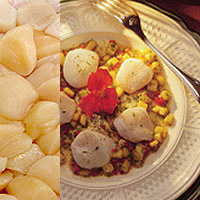Scallops

Preparation, Uses, & Tips
Scallops cook quickly and toughen with heat. Small scallops can overcook in a very short time. The secret to successful scallop cookery is to not overcook them.
Trim off any tough connective tissue. If any roe is attached, leave it on the piece and cook along with the scallop.
Marinating
Place scallops in a tangy marinade of olive oil and lemon juice. Cover and refrigerate for one hour.
Pan frying
Rinse scallops and pat dry with paper towels. Dredge in flour and spices if desired. Heat a frying pan until hot and add oil. Add scallops, making sure they are not crowded in the pan, and fry, turning occasionally, for 3 to 5 minutes. Scallops are done when opaque in the center.
Deep frying
Pour oil into a wok or deep fryer; it should be at least 1 1/2 inches (about 3.8cm) deep, and the cooker should be less than half full of oil. Heat oil to 375°F (190°C), using a thermometer to monitor temperature. Dip scallops in batter, drain, then slip them into hot oil. Cook until brown, 2 to 3 minutes.
Poaching
Rinse and drain scallops. Bring a small amount of poaching liquid, consisting of water or broth, and herbs and spices, to a simmer. Slip scallops in, then cover pan and keep liquid at a simmer until scallops are opaque in the center, 4 to 5 minutes.
Grilling
String scallops on a skewer or place them on perforated foil, 4 to 6 inches (about 10 to 15cm) above prepared coals or fire. Baste with butter, oil, or marinade, and close hood of grill. Cook just until opaque and moist on the inside, 3 to 4 minutes.
Copyright © 2025 TraceGains, Inc. All rights reserved.
Learn more about TraceGains, the company.
The information presented in the Food Guide is for informational purposes only and was created by a team of US–registered dietitians and food experts. Consult your doctor, practitioner, and/or pharmacist for any health problem and before using any supplements, making dietary changes, or before making any changes in prescribed medications. Information expires December 2025.
